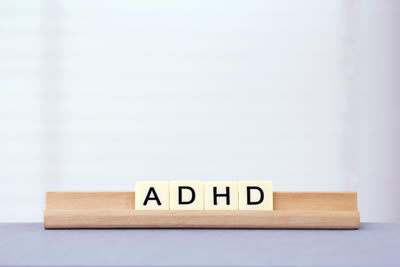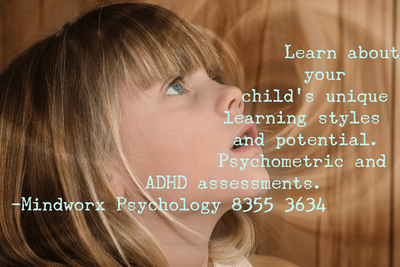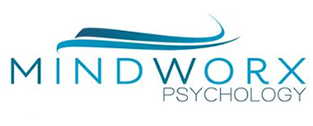ADHD
Test for attention and impulsivity problems
Testing and Diagnosis of ADHD: Attention-Deficit Hyperactivity Disorder
Is Your Child Struggling with Attention, Focus, or Impulsivity?
If your child or teenager finds it hard to concentrate, stay organised, or manage their emotions, you may be wondering if they have ADHD. At Mindworx Psychology, we offer comprehensive ADHD assessments for children and teens to provide clarity, support, and practical next steps.
Signs of ADHD in Children & Teens
ADHD presents differently in every child and teen, but common signs include:
- Difficulty focusing or completing tasks
- Struggles with organisation and following instructions
- Impulsivity, acting before thinking
- Frequent forgetfulness or losing things
- Hyperactivity or restlessness
- Emotional outbursts or difficulty managing frustration
- Challenges with school performance
Previously referred to as Attention Deficit Disorder (ADD), ADHD is now categorised as three presentations:
Testing for ADHD
What’s Involved in ADHD Testing?
Our ADHD assessment process is thorough, supportive, and child-friendly:
- Initial Consultation – We discuss your concerns, family history, and your child’s experiences.
- Comprehensive Testing – We use clinical interviews, validated questionnaires, and if needed, cognitive assessments to evaluate attention, executive functioning, and emotional regulation.
- Teacher & Parent Input – Feedback from school and home helps us build a full picture of your child’s strengths and challenges.
- Diagnosis & Report – If ADHD is identified, we provide a detailed diagnostic report outlining findings, strategies, and next steps.
- Personalised Recommendations – From school adjustments to behavioural strategies, we equip you with practical, neuroaffirming support tailored to your child.
How ADHD Testing Helps Your Child
An accurate ADHD diagnosis can unlock support, resources, and school accommodations to help your child succeed. Our assessments can help to provide:
- A better understanding of how your child thinks and learns
- Access to school adjustments, and additional support
- Personalised strategies to improve focus, emotional regulation, and confidence
Flexible, Comprehensive, Individually Tailored ADHD Assessments and Reports
ADHD Testing
We know one size does not fit everyone.
Our testing is comprehensive – but as a practice we know that families have different reasons for seeking tests and diagnosis.
We work to industry gold standards, but equally – we won’t write or charge for extensive reports, or conduct a battery of tests if you don’t need them.
For general treatment, we can screen and make a provisional diagnosis based on clinical observations that allow us to begin treatment and to provide support for ADHD.
And, when a formal diagnosis is needed, we can undertake a gold standard assessment to check if your child meets the diagnostic criteria, along with a comprehensive series of tests and assessments to check for any other learning difficulties or disorders. Such testing includes a detailed report.
We’ll discuss with you exactly what testing is needed, and helpful for your situation.
Early identification of ADHD can make a significant difference in your child’s well-being and success.
Our team at Mindworx Psychology includes Psychologists with ADHD. We are neuroaffirming and here to guide you through the process with care and expertise.
TIPS FOR PARENTING CHILDREN WITH ADHD
ROUTINES
Try to keep the same routine every day, from wake-up time to bedtime. Use visual reminders.
Include time for homework, outdoor play, and indoor activities – and allow extra time to reduce stress.
Keep copies of your schedule on the fridge, or on a bulletin board in the kitchen.
ORGANISE EVERYDAY ITEMS
Have a place for everything, and keep everything in its place. This includes clothing, backpacks, and toys.
Use age appropriate labels and pictures.
Encourage children to complete tasks e.g. part of taking off shoes is putting them away in the right place
BE CLEAR AND CONSISTENT
Children with ADHD need consistent rules they can understand and follow.
Having a neuro-atypical brain means that routines can be more challenging to learn. Make it easier by being as consistent as possible.
GIVE PRAISE OR REWARDS WHEN RULES ARE FOLLOWED
Children with ADHD often receive a lot of criticism, even when they may be trying their best.
Look for good behaviour, and praise it. Don’t wait for perfect, praise the attempt, praise the effort.
BE KIND TO YOURSELF !
Parenting children with ADHD can be filled with joy, and it can also be complex, challenging, frustrating and demanding!
Make it a priority to build in time for yourself to recharge and refresh, even if it is just a five minute walk each day.
GET PROFESSIONAL SUPPORT
It is important that children learn how to successfully master tasks. This can’t happen if they are placed in situations they are not able to cope with.
Professional advice can help you understand exactly what your child struggles with, and provide you and their teachers with strategies and solutions to help.
FIND TIPS ON OUR RESOURCES PAGE
Our Location
Suite 206, 10 Century Circuit, Norwest Central, Baulkham Hills, NSW 2155
Fees & Insurance
You do not need a GP referral to book an appointment at Mindworx Psychology.
Medicare Rebates are available if you have a valid referral from a GP, Psychiatrist or Paediatrician.
Your Private Health Fund may offer cover for Psychology Services – you can check this directly with your fund.






